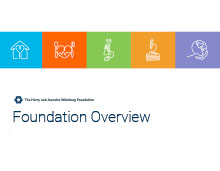A new partnership to address homelessness in Baltimore will grow the city’s supply of affordable housing with services to help people remain stable.
Over the next three years, the Foundation will collaborate with Baltimore City and local nonprofit housing developers to support the production of at least 85 units of permanent supportive housing for people experiencing chronic homelessness — and bolster the Baltimore City Housing Accelerator Fund. Earlier this year, the city’s $30 million fund awarded grants to 11 projects aimed at increasing the availability of permanent supportive housing, which includes affordable rent and services such as health care, financial coaching, and referrals to other community resources to enable people to achieve and maintain stability.
On a given night in Baltimore City, more than 1,550 people live without housing — twice the share of the U.S. population experiencing homelessness. Over 15% of these individuals are chronically homeless, which means they’ve been homeless for at least 12 continuous months with a disabling condition, such as a serious mental illness, substance-use disorder, or physical disability. In addition, more than 4,200 people seek services because they lack housing.
“The people experiencing homelessness with the greatest challenges — those suffering from chronic conditions who are most likely to die if left unhoused — need supportive services in addition to housing to remain housed,” said Amy Kleine, who leads the Foundation’s grantmaking focused on housing and helped inform the development of the city’s Housing Accelerator Fund. “Increasing availability of supportive housing is one of Weinberg’s key priorities, and this partnership will further accelerate this type of housing production in Baltimore.”
The Weinberg Foundation has invested in permanent supportive housing for nearly two decades, most recently funding an East Baltimore development, as well as another project currently underway that will create 56 units of such housing for people experiencing homelessness.
Bridging the funding gap
To incentivize the creation of permanent supportive housing, the Housing Accelerator Fund provides up to $250,000 per unit for such housing, compared to up to $100,000 per unit for typical affordable housing (defined as 60% of the area median income or below). Developers still must secure additional funding to fully cover project costs, including the services for residents.
The Weinberg Foundation aims to bridge this funding gap for up to eight of the Housing Accelerator Fund projects, similar to its support of the nonprofit housing development in East Baltimore. This will aid the developers in producing and sustaining at least 85 new units of permanent supportive housing that will serve people experiencing chronic homelessness — and a total of 320 housing units overall. Thus far, Weinberg has funded five of the Housing Accelerator Fund’s awardees.
“We are hopeful that the success of the Housing Accelerator Fund could lead to seeding another fund in the future — and that this partnership can show others how philanthropy can bolster the success of efforts to ensure all residents have a permanent, safe place to call home.” Kleine said.
Examples of Foundation-supported housing projects
- Belvedere Place is a mixed-use building planned for Baltimore’s Park Heights neighborhood. Of the 83 units of affordable housing, 11 will be permanent supportive housing. Developed by BRIDGES (Barnabas Renewal Initiatives Developing Grace Enriching Systems) Community Development Corporation in partnership with Unity Properties and Winn Companies, the building will be completed and occupied in 2026. BRIDGES aims to address the physical, economic, and social needs of Park Heights residents, distributing over 104,000 pounds of food to 13,000 families annually. Unity Properties, part of Bon Secours Community Works, has created 800 units of affordable housing across 12 developments in West Baltimore for low-income families, older adults, and people with disabilities.
- Clare Court II, slated for completion in late 2025 in Baltimore’s Waverly/Ednor Gardens neighborhood, will renovate and expand an existing development by Homes for America. The new campus will serve about 145 people annually and include 83 units of affordable housing — five of which will be permanent supportive housing — and communal space. Homes for America has completed over 80 rental communities with more than 6,700 units across Maryland, Delaware, Pennsylvania, and Virginia, primarily for families and older adults.
- New Shiloh III will provide 50 units of affordable housing in West Baltimore, including 10 units of permanent supportive housing. The project, led by Unity Properties, will offer additional services for the families and individuals who reside in them through a partnership with Foundation grantee Healthcare for the Homeless.

Photo: New Shiloh III rendering, Unity Properties.




